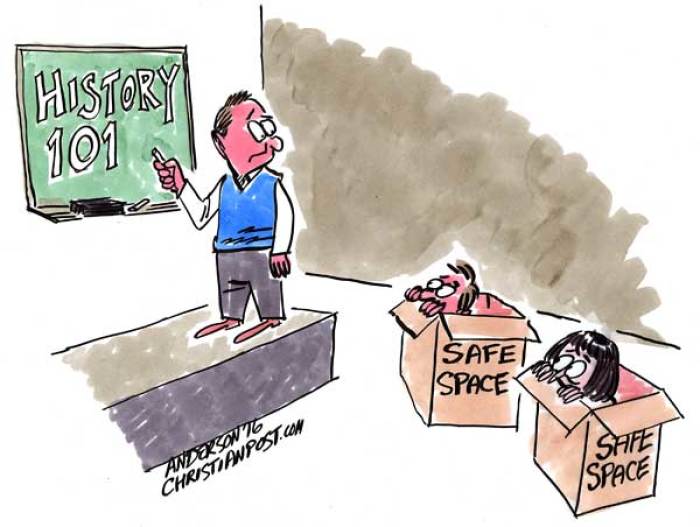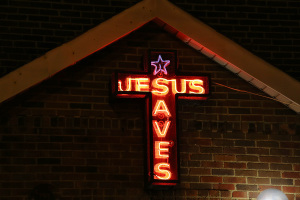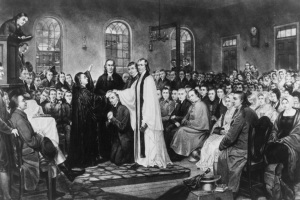Offended? Yell 'Ouch!' University Tells Students, Employees to Create 'Safe Space'

How should you tell a classmate she said something offensive? Say "ouch," and her correct response should be, "oops." This is what the University of Arizona is asking the faculty to teach their students and peers to promote diversity and inclusiveness in the classroom.
The suggestion is aimed at "creating a safe space for students for engaging in dialogue about challenging topics is vital in promoting positive intergroup interactions," and is part of a new 20-page handbook titled "Diversity and Inclusiveness in the Classroom."
"If a student feels hurt or offended by another student's comment, the hurt student can say 'ouch.' In acknowledgement, the student who made the hurtful comment says 'oops.' If necessary, there can be further dialogue about this exchange," reads the suggestion.
Other points included in the section about creating "safe space" are: "Do not interrupt others. Only one speaker should talk at a time. Encourage students to continue these conversations outside of class with their peers; however, make sure that students do not disclose the names of students who shared in class. In other words, they can share the idea without saying whose idea it was."
The handbook is credited to Vice Provost for Inclusive Excellence Jesús Treviño, who earns $214,000 a year at the public institution, according to The College Fix.
Last month, Iowa State University's Extension and Outreach division started "Ouch! That Stereotype Hurts," a workshop for local businesses and organizations.
"A main basis of the workshop is to assume in an 'ouch' moment that harm was not intended and see the learning opportunity," Iowa State University Human Sciences Specialist Malisa Rader, the program's coordinator, told the Fix. "The desire to communicate respectfully in a diverse world is what led us to look for a curriculum that could be shared with others. Simple non-blaming strategies are discussed and practiced, like asking questions, redirecting, soliciting an ally, and even simply saying 'ouch.'"
However, the "ouch-oops" method appears to presume that a speech, a statement or a conversation that involves disagreement needs to be ended.
Earlier this month, a mob of students at Middlebury College halted a conservative scholar from speaking, and one protestor assaulted a professor there, sending her to the hospital with a neck injury.
Charles Murray, a political scientist from the Washington-based American Enterprise Institute, was invited to the elite Vermont college by the school's own AEI student chapter to discuss his acclaimed book Coming Apart, an analysis of the widening economic and social disparities in the United States in the last half century. But leftist students who protested were reportedly upset about a 1994 book he co-authored called The Bell Curve, a book they considered "white supremacist" because of the way he discussed racial differences in intelligence in one section of the book.
Recently, Van Jones, a CNN panelist and a former special advisor to the Barack Obama administration, blasted the idea of providing "safe spaces" on American college campuses so that students aren't confronted by any idea that might offend them or challenge their way of thinking.
"There are two ideas about safe spaces: One is a very good idea and one is a terrible idea," Jones said at a Feb. 24 event at the Institute of Politics at the University of Chicago.
Jones explained he is fine with the idea of being physically safe on a campus. "But there's another view that is now I think ascendant, which I think is just a horrible view, which is that 'I need to be safe ideologically. I need to be safe emotionally I just need to feel good all the time, and if someone says something that I don't like, that's a problem for everybody else including the administration.'"
He added, "You are creating a kind of liberalism that the minute it crosses the street into the real world is not just useless, but obnoxious and dangerous. I want you to be offended every single day on this campus. I want you to be deeply aggrieved and offended and upset, and then to learn how to speak back. Because that is what we need from you in these communities."
The idea of creating "safe spaces" has become "so commonplace on American college campuses that it's hardly news anymore," wrote author and The Christian Post contributor Eric Metaxas last September.
It's also a "good challenge for us Christians," Metaxas wrote. "Do we create 'safe spaces' for our students, and leave them unprepared for the real world? Or do we teach them not only the Christian worldview, but help them understand opposing worldviews, so they can take them on in the marketplace of ideas?"





























